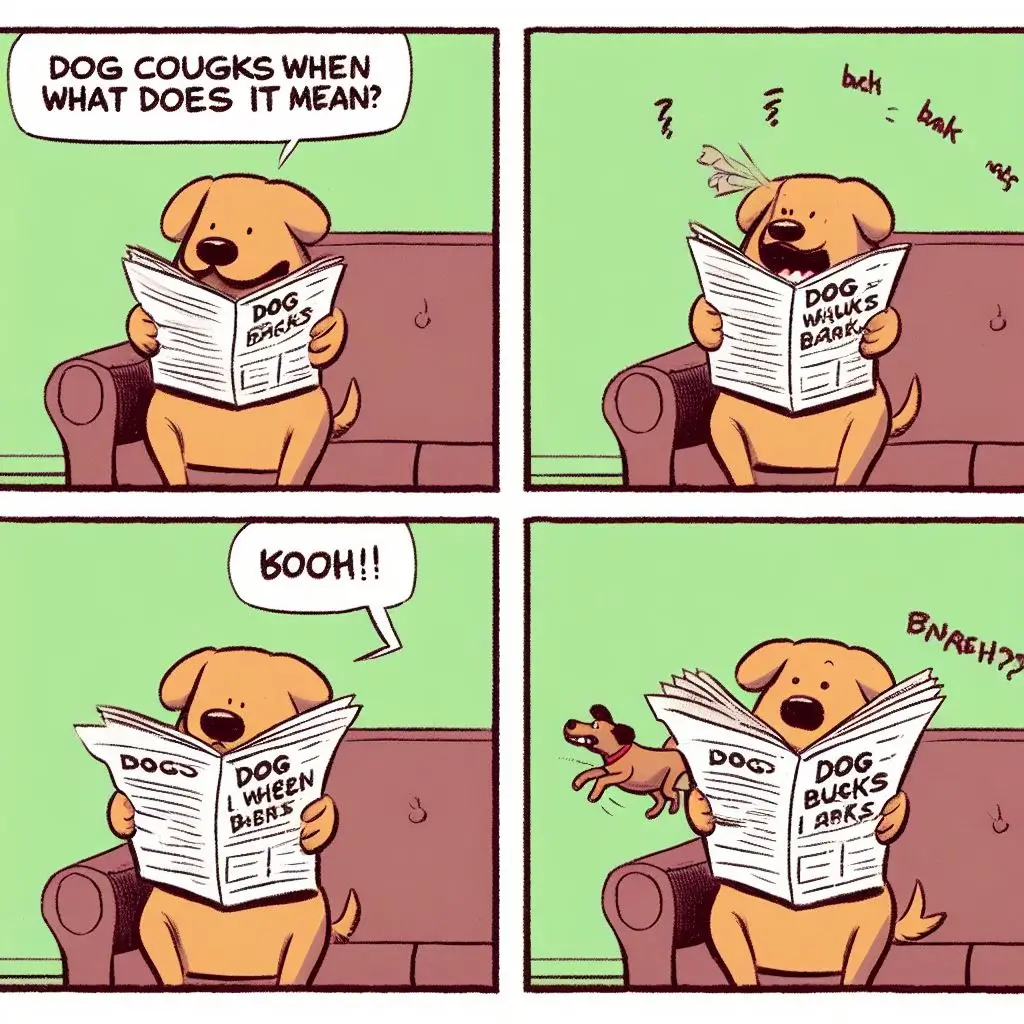If you have ever noticed your dog coughing when it barks, you might be wondering what is causing this and whether it is a sign of a serious problem. Coughing is a common symptom in dogs, but it can have many different causes and meanings. In this article, we will explore the possible reasons why your dog coughs when it barks, how to diagnose and treat the underlying condition, and when to seek veterinary attention. We will also give you some tips on how to help your dog with coughing during barking and how to manage this behavior.
Key takeaways
| What you need to know | What you can do |
|---|---|
| Coughing and barking in dogs can be related to various factors, such as respiratory infections, allergies, foreign bodies, heart disease, tracheal collapse, or behavioral issues. | Identify the type and frequency of your dog’s cough, observe any other symptoms or triggers, and consult your vet for a proper diagnosis and treatment. |
| Coughing as a response to barking in dogs can be a way of expressing excitement, frustration, anxiety, or dominance. It can also be a learned behavior that gets reinforced by attention or rewards. | Try to understand the context and motivation of your dog’s barking and coughing, and use positive reinforcement techniques to teach your dog alternative ways of communicating or coping with emotions. |
| Coughing and barking behavior in dogs can be influenced by environmental factors, such as temperature, humidity, air quality, noise, or social stimuli. | Provide your dog with a comfortable and clean living space, avoid exposure to irritants or allergens, and enrich your dog’s environment with toys, games, and social interactions. |
Why does my dog cough when it barks?
Coughing is a natural reflex that helps clear the airways of mucus, secretions, or foreign objects. It can also be a symptom of various diseases or disorders that affect the respiratory system or other organs. When your dog coughs when it barks, it could mean that something is irritating or obstructing its throat, larynx, trachea, bronchi, or lungs. Alternatively, it could mean that your dog is trying to communicate something through its vocalizations.
Some of the possible causes of coughing and barking in dogs are:
- Respiratory infections: Viral or bacterial infections can cause inflammation and irritation in the upper or lower respiratory tract, leading to coughing, sneezing, nasal discharge, fever, lethargy, or loss of appetite. Some common examples are kennel cough (also known as canine infectious tracheobronchitis), canine influenza (dog flu), canine distemper, or pneumonia.
- Allergies: Allergic reactions can trigger coughing and wheezing in dogs due to the release of histamine and other inflammatory mediators. Your dog may be allergic to pollen, dust mites, mold spores, smoke, perfume, or food ingredients. Allergies can also cause itching, skin rashes, ear infections, or digestive problems.
- Foreign bodies: If your dog inhales or swallows something that gets stuck in its throat or airways, such as a piece of food, a bone fragment, a toy part, a grass seed, or a stick, it may cough violently to try to expel it. Foreign bodies can also cause gagging, choking, drooling, difficulty breathing, or bleeding.
- Heart disease: Heart problems can affect the blood flow and pressure in the lungs and cause fluid accumulation (pulmonary edema) or congestion (pulmonary hypertension). This can result in coughing that is worse at night or after exercise. Other signs of heart disease are fatigue, weakness,
- Tracheal collapse: This is a condition where the cartilage rings that support the trachea (windpipe) become weak and collapse, causing a narrowing of the airway and a characteristic honking cough. Tracheal collapse is more common in small breeds, such as Yorkshire terriers, Pomeranians, or Chihuahuas. It can be triggered by obesity, excitement, stress, or pressure on the neck from collars or leashes.
- Behavioral issues: Sometimes, coughing and barking in dogs can be related to psychological or emotional factors, such as excitement, frustration, anxiety, or dominance. Your dog may cough as a way of expressing its feelings or getting your attention. It may also cough as a learned behavior that gets rewarded by treats, praise, or play.

Understanding coughing in dogs when they bark
To understand why your dog coughs when it barks, you need to identify the type and frequency of its cough, as well as any other symptoms or triggers that accompany it. Different types of coughs can indicate different underlying problems. For example:
- A dry, harsh, or hacking cough can suggest a respiratory infection, an allergy, a foreign body, or tracheal collapse.
- A moist, productive, or wet cough can indicate fluid accumulation in the lungs due to heart disease or pneumonia.
- A soft, gagging, or retching cough can imply a problem in the throat or esophagus, such as tonsillitis, pharyngitis, or esophageal disease.
- A high-pitched, wheezing, or whistling cough can signal a narrowing or obstruction of the airways due to asthma, bronchitis, or laryngeal paralysis.
The frequency and timing of your dog’s cough can also give you some clues about its cause. For instance:
- A persistent or chronic cough that lasts for more than two weeks can point to a serious or progressive condition that requires medical attention.
- An intermittent or occasional cough that occurs only in certain situations can suggest a mild or transient problem that may resolve on its own or with simple home remedies.
- A nocturnal or post-exercise cough that worsens at night or after physical activity can indicate a heart problem that affects the blood circulation in the lungs.
- A seasonal or environmental cough that varies with the weather or the surroundings can imply an allergy or an irritant that triggers an inflammatory response.

Additionally, you should observe if your dog has any other signs of illness or distress, such as:
- Nasal discharge
- Eye discharge
- Fever
- Lethargy
- Loss of appetite
- Weight loss
- Difficulty breathing
- Cyanosis (bluish color of the gums)
- Fainting
- Abnormal behavior
These symptoms can help you narrow down the possible causes of your dog’s cough and determine the severity of its condition.
Coughing and barking in dogs: Causes and solutions
Once you have identified the type and frequency of your dog’s cough and any other symptoms or triggers that accompany it, you should consult your veterinarian for a proper diagnosis and treatment. Your vet will perform a physical examination and ask you some questions about your dog’s history and lifestyle. They may also run some tests, such as blood work, chest X-rays, heartworm test, tracheal wash, bronchoscopy, echocardiogram, or allergy test.
Depending on the diagnosis, your vet will prescribe the appropriate medication and therapy for your dog. Some of the common treatments for coughing and barking in dogs are:
- Antibiotics: These are used to treat bacterial infections that cause inflammation and irritation in the respiratory tract.
- Antihistamines: These are used to reduce allergic reactions that cause coughing and wheezing in dogs.
- Bronchodilators: These are used to relax and widen the airways that are narrowed or obstructed due to asthma,bronchitis, or laryngeal paralysis.
- Cough suppressants: These are used to relieve the discomfort and irritation caused by coughing in dogs. However, they should be used with caution and only under veterinary supervision, as they can mask the underlying problem and interfere with the natural clearing of the airways.
- Diuretics: These are used to reduce the fluid accumulation in the lungs due to heart disease or pulmonary edema.
- Anti-inflammatories: These are used to decrease the inflammation and swelling in the respiratory tract due to infections, allergies, or foreign bodies.
- Surgery: This is used to remove or repair any structural abnormalities or obstructions that cause coughing in dogs, such as foreign bodies, tumors, polyps, or tracheal collapse.

In addition to the medical treatment, you can also try some home remedies and lifestyle changes to help your dog with coughing during barking. Some of the things you can do are:
- Provide your dog with plenty of fresh water to keep it hydrated and moisten its throat.
- Use a humidifier or a vaporizer to add moisture and warmth to the air and ease your dog’s breathing.
- Avoid exposure to smoke, dust, chemicals, or other irritants that can aggravate your dog’s cough.
- Use a harness instead of a collar to prevent pressure on your dog’s neck and trachea.
- Keep your dog’s weight under control to reduce the risk of obesity-related problems, such as tracheal collapse or heart disease.
- Enrich your dog’s environment with toys, games, and social interactions to prevent boredom and stress that can trigger barking and coughing.
- Train your dog to bark less or more quietly using positive reinforcement techniques, such as rewarding your dog with treats, praise, or play when it stops barking or barks softly. You can also teach your dog a cue word or a signal to stop barking on command.
Is your dog’s cough related to barking?
Sometimes, your dog’s cough may not be caused by a physical problem, but by a behavioral one. Your dog may cough as a response to barking, either as a way of expressing its emotions or as a learned behavior that gets reinforced by your attention or rewards.
Barking is a natural and normal way of communication for dogs. Dogs bark for various reasons, such as:
- To alert you or other dogs of something interesting or threatening
- To greet you or other dogs with excitement or joy
- To demand something from you, such as food, play, or attention
- To express frustration, boredom, or anxiety
- To assert dominance or territoriality over other dogs or people
- To respond to other dogs’ barking or noises
However, excessive or inappropriate barking can become a nuisance and a problem for you and your neighbors. It can also cause stress and strain on your dog’s vocal cords and throat, leading to coughing and irritation.
Coughing as a response to barking in dogs can be a way of:
- Showing excitement, enthusiasm, or happiness
- Venting frustration, anger, or anxiety
- Seeking attention, affection, or sympathy
- Mimicking other dogs’ coughing or barking
- Getting rewarded by treats, praise, or play
Coughing and barking in dogs can also be influenced by environmental factors, such as:
- Temperature: Cold or hot weather can affect your dog’s respiratory system and make it more prone to coughing.
- Humidity: Dry or humid air can affect your dog’s throat and mucous membranes and make it more sensitive to irritation.
- Air quality: Polluted or dusty air can irritate your dog’s lungs and trigger coughing and wheezing.
- Noise: Loud or sudden noises can startle your dog and make it bark and cough.
- Social stimuli: Other dogs, people, animals, or objects can stimulate your dog’s curiosity, interest, fear, or aggression and make it bark and cough.
How to help a dog with coughing during barking
If your dog’s cough is related to barking, you can try some of the following tips to help it:
- Identify the cause and motivation of your dog’s barking and coughing. Try to understand what your dog is trying to tell you or achieve by its vocalizations. Is it alerting you of something? Is it greeting you? Is it asking for something? Is it expressing its emotions? Is it copying other dogs?
- Provide your dog with positive alternatives to barking and coughing. Teach your dog to use other signals or behaviors to communicate its needs or feelings. For example, you can teach your dog to sit, lie down, shake hands, fetch a toy, or ring a bell instead of barking and coughing. You can also provide your dog with chew toys, puzzle toys, interactive toys, or calming toys to keep it busy and entertained.
- Reward your dog for quiet and calm behavior. Use treats, praise, petting, or play to reinforce your dog when it stops barking and coughing or when it barks softly. Ignore your dog when it barks loudly or excessively. Do not yell at your dog or punish it for barking and coughing, as this can make it worse.
- Reduce the triggers and stimuli that cause your dog to bark and cough. Avoid exposing your dog to things that make it excited,anxious, frustrated, or fearful, such as loud noises, strangers, other dogs, or unfamiliar objects. You can also use curtains, blinds, fences, or crates to block your dog’s view of the outside world. Alternatively, you can use desensitization and counterconditioning techniques to help your dog overcome its fears and associate the triggers with positive outcomes.
- Provide your dog with a comfortable and healthy environment. Make sure your dog has a clean and cozy place to sleep and rest. Provide your dog with fresh water and a balanced diet. Avoid feeding your dog spicy, salty, or fatty foods that can irritate its throat. Keep your dog’s vaccinations and deworming up to date. Avoid smoking or using strong perfumes around your dog.
- Consult your veterinarian if your dog’s cough persists or worsens. Even if your dog’s cough is related to barking, it can still be a sign of an underlying problem that needs medical attention. Your vet can examine your dog and prescribe the appropriate medication or therapy for your dog.
Coughing and barking behavior in dogs
Coughing and barking are both natural and normal behaviors in dogs that serve various functions and purposes. However, when they become excessive or inappropriate, they can indicate a physical or psychological problem that needs to be addressed. By understanding the causes and solutions of coughing and barking in dogs, you can help your dog live a happier and healthier life.
When should you be concerned about a coughing dog that barks?
You should be concerned about a coughing dog that barks if:
- The cough is persistent or chronic (lasting for more than two weeks)
- The cough is severe or violent (causing gagging, choking, vomiting, or bleeding)
- The cough is accompanied by other signs of illness or distress (such as nasal discharge, eye discharge, fever, lethargy, loss of appetite, weight loss, difficulty breathing, cyanosis, fainting, or abnormal behavior)
- The cough interferes with your dog’s quality of life or well-being (such as affecting its sleep, eating, drinking, playing, or socializing)
- The cough affects your quality of life or well-being (such as causing annoyance, stress, or complaints from neighbors)
If you notice any of these signs in your coughing dog that barks, you should consult your veterinarian as soon as possible for a proper diagnosis and treatment.
Exploring the connection between barking and coughing in dogs
Barking and coughing in dogs are both forms of vocalization that can have various meanings and functions. They can also be related to each other in different ways. Some of the possible connections between barking and coughing in dogs are:
- Barking can cause coughing: Barking can strain or damage your dog’s vocal cords and throat, leading to inflammation and irritation that trigger coughing. Barking can also increase the pressure in your dog’s chest and lungs, causing fluid accumulation or congestion that result in coughing.
- Coughing can cause barking: Coughing can stimulate your dog’s larynx and trachea, causing reflexive barking. Coughing can also make your dog feel uncomfortable or uneasy, causing emotional barking.
- Barking and coughing can have the same cause: Barking and coughing can both be symptoms of the same underlying problem that affects your dog’s respiratory system or other organs. For example,
- Barking and coughing can have the same cause: Barking and coughing can both be symptoms of the same underlying problem that affects your dog’s respiratory system or other organs. For example, respiratory infections, allergies, foreign bodies, heart disease, or tracheal collapse can cause both barking and coughing in dogs.
- Barking and coughing can have different causes: Barking and coughing can also be unrelated to each other and have different causes. For example, barking can be caused by behavioral or environmental factors, such as excitement, frustration, anxiety, dominance, noise, or social stimuli. Coughing can be caused by genetic or developmental factors, such as breed predisposition, congenital defects, or aging.
Managing coughing episodes in dogs when they bark
If your dog has frequent or severe coughing episodes when it barks, you should take some measures to prevent or reduce them. Some of the things you can do are:
- Monitor your dog’s barking and coughing patterns. Keep a record of when, where, how often, and how long your dog barks and coughs. Note any triggers or stimuli that cause your dog to bark and cough. This can help you identify the cause and severity of your dog’s problem and decide the best course of action.
- Consult your veterinarian for a proper diagnosis and treatment. Your vet can examine your dog and run some tests to determine the underlying condition that causes your dog to cough when it barks. Your vet can also prescribe the appropriate medication or therapy for your dog to relieve its symptoms and improve its health.
- Follow your vet’s instructions and recommendations. Give your dog the prescribed medication as directed by your vet. Follow your vet’s advice on how to care for your dog at home. Schedule regular check-ups and follow-ups with your vet to monitor your dog’s progress and adjust the treatment if needed.
- Provide your dog with a comfortable and supportive environment. Make sure your dog has a clean and cozy place to sleep and rest. Provide your dog with fresh water and a balanced diet. Avoid feeding your dog spicy, salty, or fatty foods that can irritate its throat. Keep your dog’s vaccinations and deworming up to date. Avoid smoking or using strong perfumes around your dog.
- Avoid or minimize the triggers and stimuli that cause your dog to bark and cough. If possible, remove or reduce the exposure to things that make your dog excited, anxious, frustrated, or fearful, such as loud noises, strangers, other dogs, or unfamiliar objects. You can also use curtains, blinds, fences, or crates to block your dog’s view of the outside world. Alternatively, you can use desensitization and counterconditioning techniques to help your dog overcome its fears and associate the triggers with positive outcomes.
- Train your dog to bark less or more quietly using positive reinforcement techniques. Teach your dog to use other signals or behaviors to communicate its needs or feelings. For example, you can teach your dog to sit,lie down, shake hands, fetch a toy, or ring a bell instead of barking and coughing. You can also provide your dog with chew toys, puzzle toys, interactive toys, or calming toys to keep it busy and entertained. Reward your dog with treats, praise, petting, or play when it stops barking and coughing or when it barks softly. Ignore your dog when it barks loudly or excessively. Do not yell at your dog or punish it for barking and coughing, as this can make it worse.
- Provide your dog with positive outlets for its energy and emotions. Make sure your dog gets enough exercise and mental stimulation to keep it fit and happy. Take your dog for regular walks, runs, or hikes. Play games with your dog, such as fetch, tug-of-war, or hide-and-seek. Enroll your dog in obedience classes, agility courses, or other activities that challenge its skills and abilities. Socialize your dog with other friendly dogs and people to improve its confidence and manners.
By following these tips, you can help your dog manage its coughing episodes when it barks and improve its health and behavior.
Hi, I’m John and I love dogs. Ever since I was a kid, I always wanted to have a furry friend by my side. I grew up with a golden retriever named Max, who taught me a lot about loyalty, friendship, and fun. He was my best buddy for 12 years, and I miss him every day.
